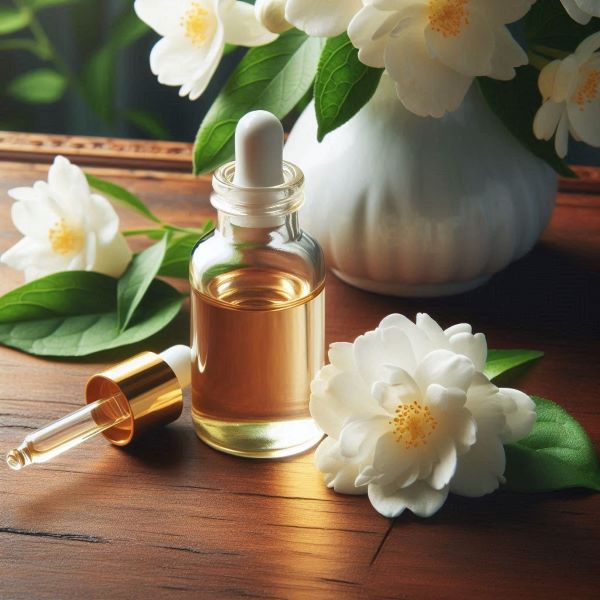Jasmine oil, derived from the white flowers of the jasmine plant (Jasminum officinale), is a revered essential oil known for its sweet, exotic fragrance and numerous therapeutic benefits. It has been used for centuries in perfumery, aromatherapy, and traditional medicine across various cultures, particularly in Asia. Jasmine oil is often referred to as the “King of Oils” due to its potent aroma and extensive uses in enhancing physical and emotional well-being. This article delves into the nutritional profile, benefits, uses, therapeutic advantages, properties, side effects, interesting facts, and scientific evidence surrounding jasmine oil.
Nutritional Profile of Jasmine Oil
It comprises a complex array of chemical compounds that contribute to its unique properties:
- Benzyl Acetate: 20-25%
- Benzyl Benzoate: 10-15%
- Phytol: 5-10%
- Linalool: 5-8%
- Methyl Anthranilate
- Jasmone
- Eugenol
These components provide jasmine oil with its distinct fragrance and therapeutic benefits.
Benefits of Jasmine Oil
1. Skin Care
- Moisturizing: Deeply hydrates the skin, making it soft and supple.
- Anti-aging: Reduces the appearance of fine lines and wrinkles due to its antioxidant properties.
- Antiseptic: Helps treat skin infections and reduce blemishes.
2. Mental and Emotional Well-being
- Stress Relief: Its calming aroma helps alleviate stress and anxiety.
- Mood Enhancer: Known to elevate mood and promote feelings of well-being.
- Aphrodisiac: Traditionally used to enhance libido and romantic feelings.
3. Antimicrobial and Anti-inflammatory Properties
- Antibacterial: Effective against various bacterial strains, aiding in infection prevention.
- Anti-inflammatory: Reduces inflammation and can soothe irritated skin and muscles.
4. Women’s Health
- Menstrual Relief: Eases menstrual cramps and discomfort.
- Hormonal Balance: Can help regulate hormonal imbalances.
Uses of Jasmine Oil
Aromatherapy
- Diffuser: Adding a few drops to a diffuser can create a calming and romantic atmosphere.
- Inhalation: Inhaling it can reduce stress and improve mood.
Topical Applications
- Skincare Products: Used in creams, lotions, and serums for its hydrating and anti-aging benefits.
- Massage Oil: Diluted with a carrier oil, it can be used for a soothing massage to relieve muscle tension and stress.
Personal Care Products
- Perfumes: A common ingredient in high-end perfumes due to its rich and long-lasting fragrance.
- Bath Products: Added to bath water or bath oils for a luxurious and relaxing experience.
Therapeutic Advantages
It offers several therapeutic benefits:
- Emotional Balance: Its calming and uplifting properties help improve emotional well-being.
- Skin Health: Enhances skin texture and appearance, offering moisturizing and anti-aging benefits.
- Antimicrobial: Helps prevent and treat infections due to its antibacterial properties.
- Women’s Health: Provides relief from menstrual discomfort and supports hormonal balance.
Properties of Jasmine Oil
- Antimicrobial: Kills or inhibits the growth of bacteria.
- Anti-Inflammatory: Reduces inflammation and soothes irritated skin.
- Antioxidant: Protects cells from damage caused by free radicals.
- Aromatic: Sweet, exotic scent that calms and uplifts the mind.
- Emollient: Provides deep hydration and improves skin elasticity.
Side Effects
While it is generally safe when used properly, some individuals may experience:
- Skin Sensitivity: This can cause irritation or allergic reactions when applied directly to the skin without dilution.
- Photosensitivity: This may increase the skin’s sensitivity to sunlight, leading to sunburn.
- Pregnancy: Pregnant women should consult a healthcare provider before using this oil.
Interesting Facts
- Historical Use: It has been used since ancient times in various cultures for its fragrance and therapeutic properties.
- Expensive Extraction: It takes about 8,000 jasmine blossoms to produce just one gram of jasmine oil, contributing to its high cost.
- Symbolism: Jasmine is often associated with love, beauty, and sensuality, and jasmine oil carries this symbolism in its use.
Also, read: All You Need to Know about Rose Oil Now
Scientific Evidence
Numerous studies support the health benefits of jasmine oil:
- Antimicrobial Activity: Research published in the Journal of Ethnopharmacology demonstrates jasmine oil’s effectiveness against a range of bacteria. (Source)
- Anti-Inflammatory Effects: A study in Evidence-Based Complementary and Alternative Medicine highlighted the anti-inflammatory properties of jasmine oil, confirming its use in treating skin conditions and inflammation. (Source)
- Mood Enhancement: Research in the Journal of Health Research supports the use of jasmine oil in reducing anxiety and improving mood. (Source)
Conclusion
It is a luxurious and potent essential oil with a rich history and a wide range of benefits. Its uses span from skincare and perfumery to mental and emotional well-being. While it is generally safe when used properly, it is essential to be aware of potential side effects and use it with caution. Supported by scientific evidence, jasmine oil continues to be a valuable addition to natural health and beauty routines, offering a blend of therapeutic and aromatic benefits that enhance overall well-being.





